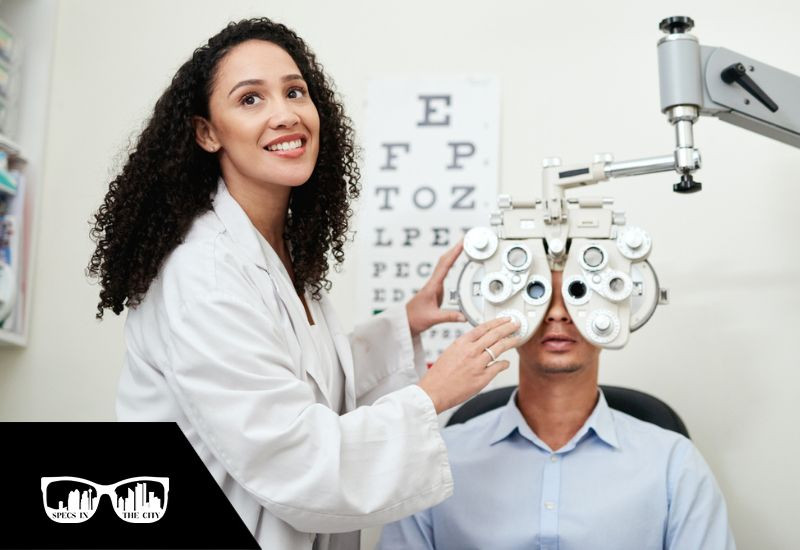Visiting the optometrist can feel a bit awkward and confusing- especially during that one exam where you sit with your chin in that machine, stare at a pixelated screen and press a button to react to a moving light like an unnerving throwback to the 1958 version of Pong. To make it even more pleasant, you’re given a trendy eye patch to wear over one eye while you sit in the dark for a convenient 5-10 minutes.
If you google “vision field testing near me,” you might get some dissuading reviews from patients ranting that this test is the single most disliked test performed by eye doctors. If you’ve ever had one, it may have seemed endless, made your eyes watery from staring or left you ready for a nap.
So what is it for, why do you have to take it, and what does it mean if you fail a visual field test? Read on to find out the coveted answer you’ve asked yourself during this procedure.
Take Charge of Your Eye Health At Our SE Calgary Eye Clinic
Although we can’t make a visual field test or perimetry exam, and less cumbersome, we are happy to accommodate your questions. We agree with you that it is not the most riveting activity you could be doing during your afternoon off work. We can also make sure this procedure goes as painlessly as possible and ensure your long-term vision care and health are in good hands.
What is a Field of Vision Test For?
Many things, like Vision field testing, are not as bad when we understand the reasoning behind it. An absurd and abstract test suddenly becomes an empowering and actionable tool to take charge of your eye health. It can be used for glaucoma screening and prevention, retinal diseases, eyelid drooping, and damage to the optic nerve (exciting stuff, we know). As optometrists, we might be biased, but it is exciting to see that you can perform a glaucoma test to catch early and subtle signs of glaucoma, for example, which might otherwise only be caught by the time significant vision loss has occurred.
Here are a few other screening purposes of field vision testing that you may find motivating:
- Detect and monitor retinal diseases
- Detect the presence of tumours
- Note any injury or swelling in the optic nerve
- Detect nutrient deficiency
- Detect history of strokes
- Measure circulation
- Detect an inflammatory disease that manifests near the optic nerve and the brain
- Increased pressure in the skull
How Does a Vision Field Test Work?
There are several types of visual tests; The first one described earlier in this article refers to a method that uses a computerized instrument. The other two most common types are the Amsler Grid Test and the Confrontation Visual Field Test. All these tests will test a patient’s peripheral vision by having them sit directly forward while staring at a point. The optometrist measures how well the eye can see in every direction without moving the head and the extent they can see in that direction. The patient will then signal when they observe a light appear in their peripheral vision. These tests also help optometrists observe the connection between the eye, or retina, the optic nerve, which transports visual information, and the brain, which processes this information and tell us what we see. During these tests, an optometrist uses their training and experience to identify any abnormalities or inconsistencies in regular, known patterns- although computerized tests can be more accurate because of the automated testing method.
What Does It Mean If I Fail a Vision Field Test?
A ‘failed’ vision field test may indicate that your eyesight is slightly less perceptive in certain zones. This usually shows vision loss somewhere in the central or peripheral vision, although possible, but not necessarily in noticeable or significant proportions. It could also indicate an obstruction somewhere along the optic pathway such as inflammation or a tumour. Computer instruments will give a detailed report as to the locus and extent of vision loss. Contrastingly, “normal” results indicate normal vision with no apparent concerns. All this information helps your optometrist diagnose any health concerns, treatment plans or determine areas that require further investigation and testing.
Time For Your Annual Eye Exam?
If you're experiencing eye soreness, blind spots, or trouble seeing at night, you should get an assessment from an optometrist to diagnose the root cause and maintain long-term eye health. If you think you might be suffering from glaucoma, it's essential not to delay seeing your optometrist. Our SE Calgary optometry clinic can help you rule out any disease or eye conditions and develop treatment options to relieve your aggravating symptoms. Our SE Calgary optometrists are here for you; book an eye exam with us today!
FAQ’s
Who needs a vision field test?
Your optometrist will inform you that you should perform a visual field test during every eye exam (annual). However, if you come in with any health concerns, are older, or at risk (or have confirmed) glaucoma, your eye doctor may request more frequent testing. Suppose you are experiencing any vision loss or other health problems. In that case, your neurologist may also perform this test to diagnose possible causes and conditions. Vision field testing is usually recommended for patients experiencing tunnel vision symptoms such as abnormal pupils, difficulty seeing at night, light sensitivity, or even eye swelling and soreness.
Why would my optometrist ask me to repeat the test?
Sometimes your optometrist will have to ask you to perform the test again or intermittently to make sure results are accurate and measure decline/progress over time (especially for glaucoma screening).
What are the signs of glaucoma?
Signs to visit an optometrist for glaucoma testing include:
- Throbbing headaches
- Redness and eye pain
- Blurry or unclear vision.
- Feelings of nausea or even vomiting
- Seeing Halos, stars or circles around lights.


.jpg)
